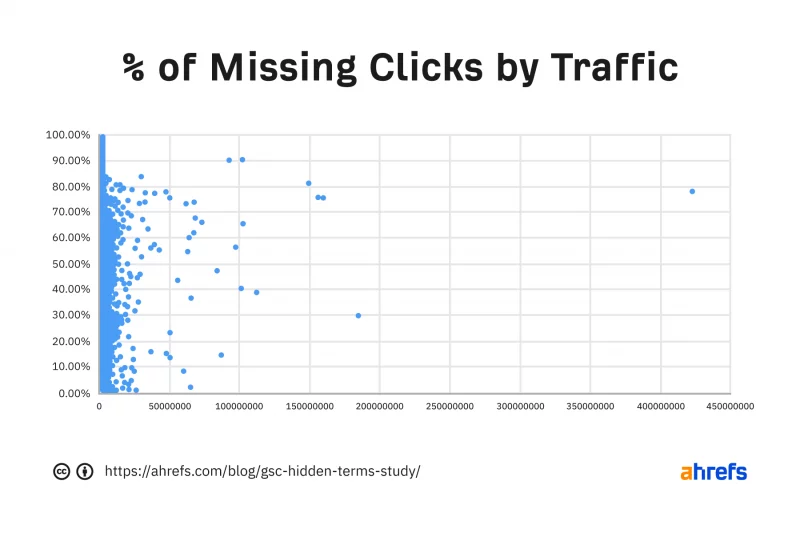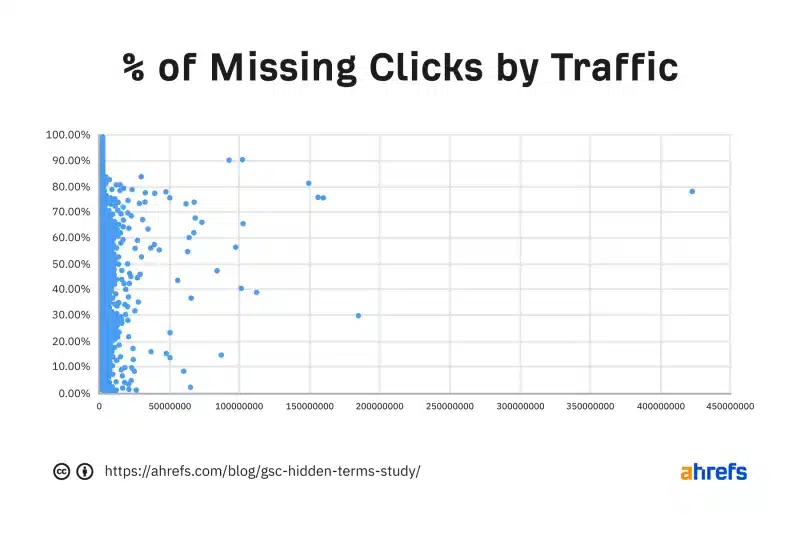A recent study from Patrick Stox, Ahref’s product advisor, showed that nearly half of all clicks reported in Google Search Console had hidden or anonymized queries. When looking at some individual sites, we saw some sites only had 15% of queries reported in Google Search Console, but on average, the Ahrefs study showed Google hid 46.08% of all query data.
As a result, Google on Friday has updated its help document to remove the words that anonymized queries are “very rare.” Google also told us they clarified their data limits for these reports in this help document as well.
The data. The study looked at 146,741 websites and about 9 billion total clicks and it compared the total clicks by URL compared to the clicks by query reported in Google Search Console. It found that Google hid 46.08% of all query data, or as Google calls it, classified them as anonymized queries.
Here is a scatter plot of the 146,741 websites showing a dot for what percentage of queries were anonymized in the Search Console reports.

Check your own data. Stox made a super useful Data Studio report where you can see how many queries are hidden for the sites you track in Google Search Console. Make your own copy of the report and add your Google Search Console data as a source. Here are the steps laid out by Stox:
- In the top right, click the three dots and then click “Make a copy.”
- In the dropdown for “New Data Source,” select the GSC data source for the site you’re interested in.
- If the site isn’t available, select “Create data source.” Search for “Search Console” and click it.
- Click the GSC property you want to use > click “Site Impression” > click “Web.” Then in the upper-right corner, click “Connect.”
- In the upper-right corner, click “Add To Report.”
- Click “Copy Report.”
When I look at my site, Search Engine Roundtable, I see Google shows the total clicks at 1,016,076 but is only showing query data for 547,382, which is 46.13%. This site, Search Engine Land, is showing the number at 43.94%. And our sister site, MarTech, is at about 70% of queries being hidden.
Google updates help document. I asked Google about this and in response to this study and the actual data seen, Google updated its help document from:
“Very rare queries (called anonymized queries) are not shown in these results to protect the privacy of the user making the query”
To:
“Some queries (called anonymized queries) are not shown in these results to protect the privacy of the user making the query.”
I bolded the updated terminology – where Google changed it from saying “very rare” to “some.”
Not 100% new. Google in 2018 start hiding anonymized query data for privacy reasons. Google said back then “an anonymous query is a query submitted [by] only a few users.”
The company said that the number of queries removed from report totals depended on the site. “Some sites will have very few unique queries; other sites will have a large proportion of anonymous queries,” Google said.
So Google did say some sites may see a “large proportion of anonymous queries.” And Google does define anonymized queries as how unique a particular query, not how rare it might be, outside of the update it made to the Google document as mentioned above.
The API. Also, it is important to note that there are limits on how many rows of data that the Google Search Console API and the Google Search Console web user interface will return. Regular users of the Google Search Console API are likely familiar with this, and it has been somewhat explained as part of the rowLimit property here.
When our queries went away. When Google Analytics stopped showing query data, aka the not provided situation, Google told us to get the data in a privacy friendly way through Google Search Console. That was back in 2011, severals years prior to Google hiding query data in Search Console for privacy reasons as well. Also, there is the debate, as mentioned by Danny Sullivan, former editor at Search Engine Land and current Google Search Liaison, about Google showing query data to advertisers but not free organic listings. Since then, in 2020, Google Ads began limiting some search term data (specifically without clicks) for advertisers.
Why we care. As marketers, we keep losing more valuable data to help our businesses succeed online. Truth is, we are living in a more privacy-centric world, at the bar for privacy continues to climb. We need to continue to adapt and leverage the data we have to help our businesses grow online.
The early days of online marketing data is probably long gone and we will likely tell our children and grandchildren the amazing and probably shocking (to them) areas we were able to target our ad campaigns around.
We need to adapt and prepare for even less data for our marketing campaigns in the future, no matter how much we might dislike it.
The post Google removes language in help doc calling hidden Search Console query data ‘very rare’ appeared first on Search Engine Land.
Source: Search Engine Land

